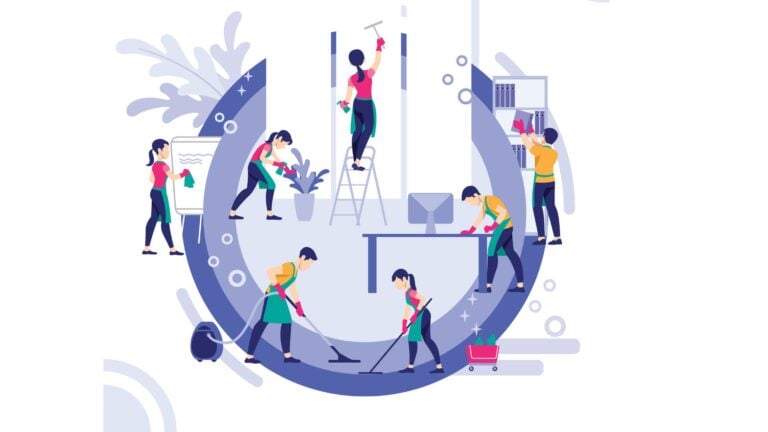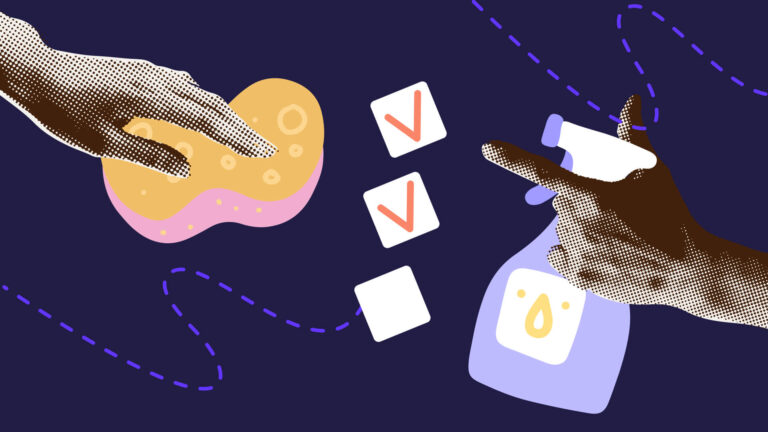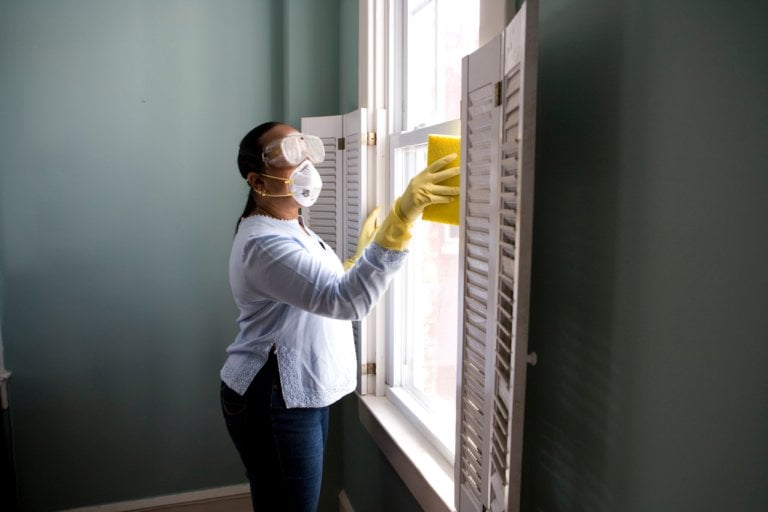Learn about the key duties, responsibilities, and qualifications that should be in a cleaner job description, and use our job description template for your hiring.
As a cleaning business owner, finding dependable and meticulous cleaners is crucial to your success.
Use this template to attract the right candidates who will uphold your standards and keep your clients satisfied.
Simplify your hiring process with a comprehensive and customizable job description that highlights the key responsibilities and qualifications for the role.
Cleaner Job Description Template
>> Download this template for your hiring. <<
[BUSINESS NAME] is hiring a reliable and detail-oriented cleaner to join our team.
Reporting to the Cleaning Supervisor, the successful applicant will be responsible for maintaining cleanliness and hygiene standards in various settings, including offices, homes, and commercial buildings.
The ideal candidate will have strong attention to detail, physical stamina, and prior cleaning experience.
Job responsibilities:
- Perform general cleaning duties such as sweeping, mopping, and vacuuming floors
- Dust and polish furniture, fixtures, and fittings
- Clean and sanitize restrooms, kitchens, and other common areas
- Empty trash receptacles and replace liners
- Replenish supplies such as toilet paper, hand soap, and paper towels
- Wash windows, mirrors, and glass surfaces
- Clean carpets and upholstery as needed
- Handle special cleaning tasks such as carpet shampooing and floor waxing
- Follow workplace health and safety rules
- Report any maintenance or repair needs to the supervisor
- Ensure all cleaning equipment and supplies are stored safely and securely
- Provide excellent customer service and handle any client inquiries or complaints professionally
- Accurately log completed tasks and working hours
Qualifications and skills:
- High school diploma or GED
- 1+ years of experience as a cleaner or janitor
- Knowledge of cleaning chemicals, supplies, and techniques
- Ability to operate cleaning equipment such as vacuums and floor buffers
- Strong attention to detail and thoroughness
- Physical stamina to perform cleaning tasks and lift heavy items
- Reliable and punctual with a strong work ethic
- Good communication skills and ability to follow instructions
- Friendly with good interpersonal skills
- Able to work independently and as part of a team
Working hours:
- Full-time, year-round
- Mon–Fri 7:00am–3:00pm
- Overtime is available but not required
Compensation:
- $15–18/hour (based on experience)
- Health insurance, including dental and vision
- Paid holidays, time off, and parental leave
- 401(k) matching and life insurance
This position will require a background check upon hire.
About [BUSINESS NAME]
Write 6–8 sentences introducing your business and saying why it’s great to work for.
How to Apply:
Include instructions for applying (e.g., email address, job board, form).
We are an equal opportunity employer and value diversity at our company. We do not discriminate on the basis of race, religion, color, national origin, gender, sexual orientation, age, marital status, veteran status, or disability status.
This Might Interest You
Read our in-depth guide about the best cleaning business software solutions and 30+ types of cleaning services you can offer and how much you can ask for it.
What Does a Cleaner Do?
Cleaners play a crucial role in maintaining a clean, sanitary, and orderly environment in various settings, including residential homes, offices, commercial buildings, and public spaces.
The primary responsibilities of a cleaner include:
General Cleaning:
- Sweeping, Mopping, and Vacuuming: Floors are cleaned to remove dirt, dust, and debris, ensuring a tidy environment.
- Dusting and Polishing: Furniture, fixtures, and surfaces are dusted and polished to maintain a clean and attractive appearance.
- Surface Cleaning: High-touch surfaces such as countertops, desks, and tables are wiped down regularly to prevent the spread of germs.
Sanitizing and Disinfecting:
- Restroom Cleaning: Restrooms are thoroughly cleaned and sanitized, including toilets, sinks, and mirrors. Supplies like toilet paper, soap, and paper towels are replenished as needed.
- Kitchen Cleaning: Kitchen areas, including sinks, countertops, and appliances, are cleaned and sanitized to maintain a hygienic space.
Waste Management:
- Trash Removal: Trash bins are emptied, and liners are replaced to prevent overflow and maintain cleanliness.
- Recycling: Waste is sorted and disposed of according to recycling and waste management guidelines.
Specialized Cleaning:
- Window and Glass Cleaning: Windows, mirrors, and other glass surfaces are cleaned to remove smudges and streaks.
- Carpet and Upholstery Cleaning: Carpets and upholstered furniture are vacuumed and cleaned as needed, including spot cleaning and deep cleaning.
- Floor Care: Hard floors may require additional care such as waxing, buffing, or polishing.
Equipment Handling:
- Operating Cleaning Equipment: Cleaners use various tools and equipment such as vacuums, floor buffers, and carpet cleaners efficiently and safely.
- Maintaining Supplies: Cleaning supplies and equipment are stored properly and kept in good working order. Cleaners report any maintenance or repair needs.
Health and Safety Compliance:
- Following Safety Protocols: Cleaners adhere to health and safety regulations to ensure a safe working environment for themselves and others.
- Using Cleaning Chemicals Safely: Appropriate cleaning agents are used, and safety data sheets (SDS) are followed to handle chemicals safely.
Customer Interaction:
- Providing Customer Service: Cleaners may interact with clients or occupants, addressing any inquiries or concerns professionally and courteously.
Reporting and Record Keeping:
- Logging Tasks and Hours: Cleaners accurately log completed tasks and working hours.
- Reporting Issues: Any maintenance or repair issues are reported to supervisors to ensure timely resolution.
This Might Interest You
Search our library of cleaning checklists and templates to use for your cleaning business and keep everything sparkling and your clients happy. Read our guide on how to get clients for your cleaning business or read our in-depth guide on the best cleaning checklist apps.
By performing these duties, cleaners help create a clean, safe, and pleasant environment for everyone using the space.
Skills and Qualifications:
Skills
- Attention to Detail: Ability to notice small areas of dirt and grime that might be easily overlooked.
- Physical Stamina and Strength: Cleaning can be physically demanding; stamina and strength are necessary to perform tasks like moving furniture, mopping, and vacuuming for extended periods.
- Time Management: Efficiently managing time to complete all cleaning tasks within the allotted schedule.
- Organizational Skills: Keeping cleaning supplies and equipment in order and managing schedules when handling multiple spaces.
- Communication: Ability to understand instructions and communicate effectively with employers, clients, and team members.
- Problem-Solving: Addressing unexpected issues like spills or the need for urgent cleaning effectively.
- Reliability and Trustworthiness: Handling the responsibilities of cleaning without supervision and often in private spaces.
Qualifications
- High School Diploma or Equivalent: While not always required, some employers prefer a basic educational background.
- Training/Certification: Some cleaners receive on-the-job training, but professional certification courses are also available that cover cleaning techniques, chemical handling, and sanitation practices.
- Background Check: Cleaners often need to pass background checks, especially if they work in schools, healthcare facilities, or homes.
- Experience: Previous experience in cleaning or maintenance roles can be beneficial but is not always required.
- Specialized Knowledge: For industrial or specialized cleaning roles, knowledge of handling specific cleaning chemicals or operating machinery can be required.
This Might Interest You
Read our in-depth guide about how to promote your cleaning business and get more clients.
Salary Expectations:
Cleaner salaries can vary widely depending on several factors, such as location, experience, and the type of employer.
Here’s a detailed overview of what you can expect in terms of compensation for a cleaning position:
Entry-Level Cleaners:
Entry-level cleaners typically earn between $10 and $15 per hour. This translates to an annual salary of approximately $20,800 to $31,200 for full-time employment.
Experienced Cleaners:
Cleaners with several years of experience or specialized skills can expect to earn between $15 and $20 per hour. This results in an annual salary of about $31,200 to $41,600.
Specialized Cleaners:
Cleaners who perform specialized tasks, such as deep cleaning or hazardous waste cleanup, may earn higher hourly wages of $20 to $25, which translates to an annual salary of $41,600 to $52,000.
Supervisory or Management Roles:
Those in supervisory or management positions overseeing a team of cleaners can expect higher compensation, with salaries ranging from $35,000 to $60,000 or more per year.
This Might Interest You
Learn how to hire the best cleaning staff in our in-depth guide.
Looking to price your house cleaning jobs? Try our free cleaning costs calculator.
Factors Influencing Salary:
- Geographic Location:
- Salaries can vary significantly based on the cost of living in different regions. Urban areas or regions with a higher cost of living generally offer higher wages compared to rural areas.
- Type of Employer:
- Cleaners working in private homes may earn less compared to those employed by commercial cleaning companies.
- Commercial cleaning companies often offer more competitive wages and benefits.
- Government and institutional settings may offer higher wages and better benefits.
- Benefits:
- Many employers offer additional benefits that can significantly enhance overall compensation. These benefits may include:
- Health insurance
- Dental and vision coverage
- Paid time off
- Retirement plans
- Bonuses
- Many employers offer additional benefits that can significantly enhance overall compensation. These benefits may include:
- Unionized Positions:
- Cleaners who are part of a labor union may have negotiated wages and benefits, which can result in higher pay and better job security.
- Experience and Training:
- More experienced cleaners or those with specialized training and certifications can command higher wages due to their advanced skills and knowledge.
Additional Compensation:
- Overtime: Cleaners may have the opportunity to earn overtime pay, typically at 1.5 times their regular hourly rate, for hours worked beyond the standard 40-hour workweek.
- Bonuses: Some employers offer performance-based bonuses or annual bonuses based on company performance.
Education and Training Requirements:
The education and training requirements for cleaners are generally minimal, but there are opportunities for formal training that can enhance a cleaner’s skills and employability. Here’s a breakdown:
Education Requirements
- Basic Education: While there are no strict educational requirements, some employers may prefer cleaners to have at least a high school diploma or equivalent. This ensures basic literacy and numeracy skills, which are helpful in following instructions and managing cleaning schedules.
Training Requirements
- On-the-Job Training: Many cleaners learn their skills on the job. Experienced staff or supervisors usually provide training on specific cleaning methods, the use of equipment, and the proper handling of chemicals.
- Professional Training Programs: There are training programs available that can provide cleaners with a more formal education in various aspects of cleaning. These might include:
- Cleaning techniques: Proper ways to clean different types of surfaces and spaces.
- Chemical handling: Safety protocols for using and storing cleaning chemicals.
- Equipment use: Training on how to operate industrial cleaning equipment such as floor buffers, steam cleaners, and heavy-duty vacuums.
- Sanitation and hygiene practices: Especially important in healthcare settings or food service environments.
Certifications
- Certified Custodial Technician: Offered by organizations like the Cleaning Management Institute, this certification covers basic and advanced knowledge about cleaning.
- Specialized Certifications: There are also certifications for specific areas such as green cleaning, biohazard cleanup, and healthcare cleaning.
Did You Know?
Connecteam’s employee training feature lets you create engaging and bite-sized training sessions in just a few minutes. You can then distribute the lessons to your entire team with just a click and check their knowledge with a quick quiz. The dashboard will show you exactly who took the training, who passed the test, and who needs more support.
Get started with Connecteam for free today!
Experience Requirements:
Clearly defining the experience requirements for hiring cleaners is crucial for building a competent team. Here are key considerations for setting experience requirements in your cleaning business:
Setting Experience Requirements
- Assess Your Business Needs: Determine the level of experience necessary based on the services your business offers. For general residential cleaning, minimal experience might be sufficient, while commercial or specialized cleaning services might require candidates with more extensive backgrounds.
- Define Job Roles Clearly: Specify the experience needed for different roles within your company. Entry-level positions might not need prior experience, but roles that involve specialized equipment or sensitive environments (like hospitals or industrial sites) should require specific experience.
- Consider On-the-Job Training Potential: If your business model can support it, hiring less experienced workers and providing comprehensive training can be a cost-effective way to build your workforce. This approach allows you to shape employees to meet specific standards and practices unique to your business.
- Leverage Experienced Hires for Training and Leadership: Hiring a few highly experienced cleaners can bolster your team’s overall skill level. These employees can take on supervisory roles and help train newer staff, ensuring high standards across the board.
Evaluating Experience
When evaluating potential hires, consider:
- Relevant Past Roles: Look for candidates who have worked in settings similar to the ones your business services. Experience in relevant environments can be a strong indicator of a candidate’s ability to meet your clients’ expectations.
- Longevity and Stability: Evaluate how long candidates have stayed in previous cleaning positions. Longevity can indicate reliability and satisfaction, important qualities for maintaining consistent service quality.
- References and Recommendations: Checking references can provide insights into a candidate’s work ethic, reliability, and effectiveness in previous cleaning roles.
Experience Documentation and Verification
- Detailed Work History: Require detailed work histories during the application process. This includes types of cleaning performed, equipment and chemicals used, and any supervisory roles.
- Certifications and Special Training: Ask for any professional cleaning certifications or special training courses completed, which can supplement basic experience and demonstrate a commitment to the profession.
FAQs
What are cleaner duties and responsibilities?
Cleaners typically handle a variety of tasks to maintain a clean and sanitary environment. Here are some common ones:
- General cleaning: Dusting, sweeping, vacuuming, mopping floors
- Bathroom cleaning: Disinfecting toilets, sinks, showers, and tubs
- Kitchen cleaning: Cleaning appliances, countertops, and floors
- Emptying trash and recycling bins
- Replacing cleaning supplies
- May also include laundry, window cleaning, or other specific duties
How do I write a job description for a house cleaner?
Here’s a quick guide to writing a house cleaner job description:
- Start with a summary: Briefly describe the role and what you’re looking for in a cleaner.
- List responsibilities: Outline the cleaning tasks you expect them to handle.
- Mention qualifications: Specify any desired experience or skills (e.g., attention to detail, eco-friendly cleaning methods).
- Benefits and compensation: Highlight any benefits you offer (paid time off, for example) and mention your pay rate.



